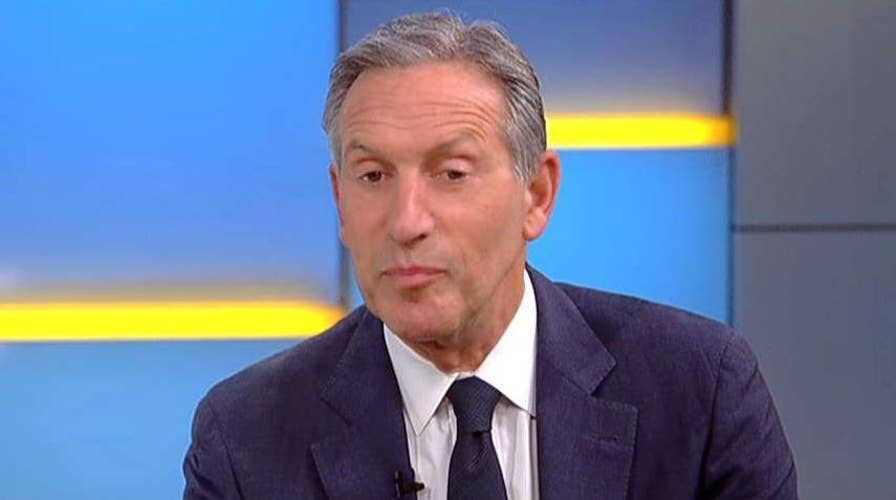Howard Schultz: We can't have a country where millions of people are being left behind
Speaking on 'Fox & Friends,' Starbucks founder and potential 2020 independent presidential candidate Howard Schultz asks where Republicans and President Trump are on addressing America's $22 trillion debt.
Howard Schultz explains that the reason he’s seriously considering an independent run for the White House is “the two-party system is broken.”
And despite historical headwinds and what would be fierce opposition from the political machines of both those parties, analysts suggest the increasingly polarized climate could give the former Starbucks CEO an opening -- however narrow -- to mount a competitive bid in the 2020 cycle.
WATCH THE HOWARD SCHULTZ TOWN HALL ON FOX NEWS CHANNEL ON THURSDAY AT 6:30 PM ET.
At the very least, Schultz could soon test the conventional wisdom that third- or no-party bids are lost causes in a modern presidential race.
“We have issues right now that must be solved. They will not be solved by two parties that are in bed every single day to defeat one another as opposed to representing the American people,” the billionaire coffee magnate said this week in an interview on "Fox & Friends."
Schultz argued that the more than 40 percent of Americans who call themselves independents “are looking for an alternative other than a Republican or a Democrat.”
While it's true that independents nowadays make up the largest bloc of voters, many of them lean toward the Democratic or Republican parties. And the deck remains very much stacked against a White House bid by an independent or third-party candidate.
“An independent could win the presidency, but I don’t think it’s very likely,” said Nate Silver, the founder and editor in chief of FiveThirtyEight, a well-known website that focuses on polling analysis.
George Washington was the first – and last – independent to win the presidency. And he had the support of the Federalists, the most powerful political party at the beginning of the republic.
Alabama’s George Wallace was the last independent or third-party candidate to grab any electoral votes, as he won a bunch of southern states in the 1968 presidential election.
DEMOCRATS FRANTIC SCHULTZ COULD TIP 2020 ELECTION TO TRUMP
Ross Perot illustrated how hard it is for an independent in the modern era to be competitive in the race for the states and their all-important electoral votes. Perot, who ran as a centrist against GOP President George H.W. Bush and Democratic Gov. Bill Clinton of Arkansas, captured nearly 19 percent of the national popular vote in the 1992 election. But he failed to carry a single state and ended up with zero electoral votes.
“Elections in general and the presidential election in particular are structured to ensure that a member of one of the two parties emerges victorious. The path for a third party or true independent is incredibly narrow and bordering the non-existent,” political scientist Wayne Lesperance said.
Former New York City Mayor Mike Bloomberg – the billionaire media mogul and environmental and gun safety advocate – weighed running as an independent in the 2016 presidential election before deciding against such a bid.
Earlier this year, after Schultz announced he was considering an independent White House run, Bloomberg wrote that "the data was very clear and very consistent. Given the strong pull of partisanship and the realities of the electoral college system, there is no way an independent can win. That is truer today than ever before."
But Lesperance, the vice president of academic affairs at New England College, highlighted that with the current unpredictable political climate and a displeasure by many in the middle with both the Democrats and Republicans, “the 2020 election represents one of the best opportunities for the right independent candidate to navigate a very narrow path” toward winning the presidency.
“What would be needed is a candidate with virtually unlimited financial resources, a candidate whose position allows for a platform that attracts more centrists voters currently unhappy with the shifts to the right and left of the Republican and Democratic parties respectively, and a candidate that can overcome one of the greatest hurdles of all -- the notion that a vote for a third party candidate is a wasted vote,” he added.
Schultz – with his money – may have the ability to overcome the questions of resources, organization and name recognition and could possibly make a compelling case to centrist voters.
He’s repeatedly vowed that “I will not seek the presidency unless I believe it is possible to win, and for me to govern well.”
And he’s promised he’d be on the ballot in all 50 states.
But the question remains – can Schultz overcome the deep concerns many people have of wasting their vote?
Democrats are doing all they can to keep him out of the race, worried he could help throw the election to Trump.
American Bridge 21st Century, a leading pro-Democratic opposition research shop, already is mounting an offensive against him.
“We think it’s very clear that Howard Schultz would throw the election to Donald Trump and so we’re treating him as a target of equal standing with Trump,” American Bridge communications director Andrew Bates told Fox News.














































